Features
NICARAGUA: SPECTER OF THE CANAL
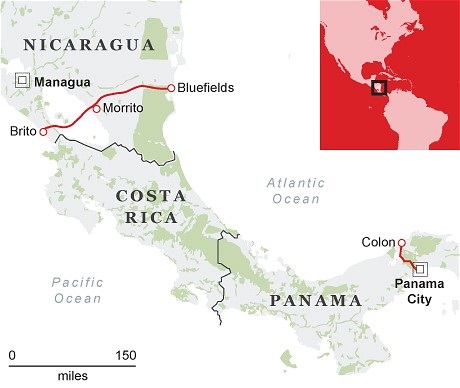
by Diego Cupolo, Upside Down World
Exactly 100 years after its inauguration, the Panama Canal may soon become one of two waterways linking the Atlantic and Pacific oceans. In a move that would alter world commerce, Nicaraguan President Daniel Ortega and Chinese telecoms billionaire Wang Jing have announced plans to start construction on a $40-billion canal across Nicaragua this December.
"Central America is at the center of North-South and East-West global trade flows, and we believe Nicaragua provides the perfect location for a new international shipping and logistics hub," Wang said in a press release. "Global shipping demands the efficiency and cost competitiveness of increasingly larger ships, and we believe this project will serve that still unmet need."
The proposed waterway would lead ships into Lago de Nicaragua, the nation's largest fresh water source, and require approximately 120 miles of excavation through sparsely populated jungles in the Nicaragua's southeastern region, as well as excavation on the Pacific Coast.
MOSUL, MALIKI AND ISIS: THE KURDISH FACTOR
The View Today from Erbil
by Bill Park, openDemocracy
ERBIL — Life in Erbil continues pretty much as normal. Children chase the pigeons that gather by the fountains outside the bazaar at the foot of the city's ancient citadel; young couples share an ice cream; women try on shoes; and the men sit in the shade drinking endless tulip glasses of sweet chai and chatting—probably about the twists and turns of the world cup, judging by the crowds that gather around the large number of TV screens showing each and every game in tea shops, shopping malls, hotels and restaurants.
Yet Mosul, scene of a dramatic take-over by ISIS fighters just days ago, the complete disintegration of the locally deployed units of the Iraqi army, and the flight of half a million terrified citizens to the borders of the Kurdish region, is just a few hours' drive away.
OCCUPY FORTUL
Colombian Poor Reclaim Lands Slated for Military Base
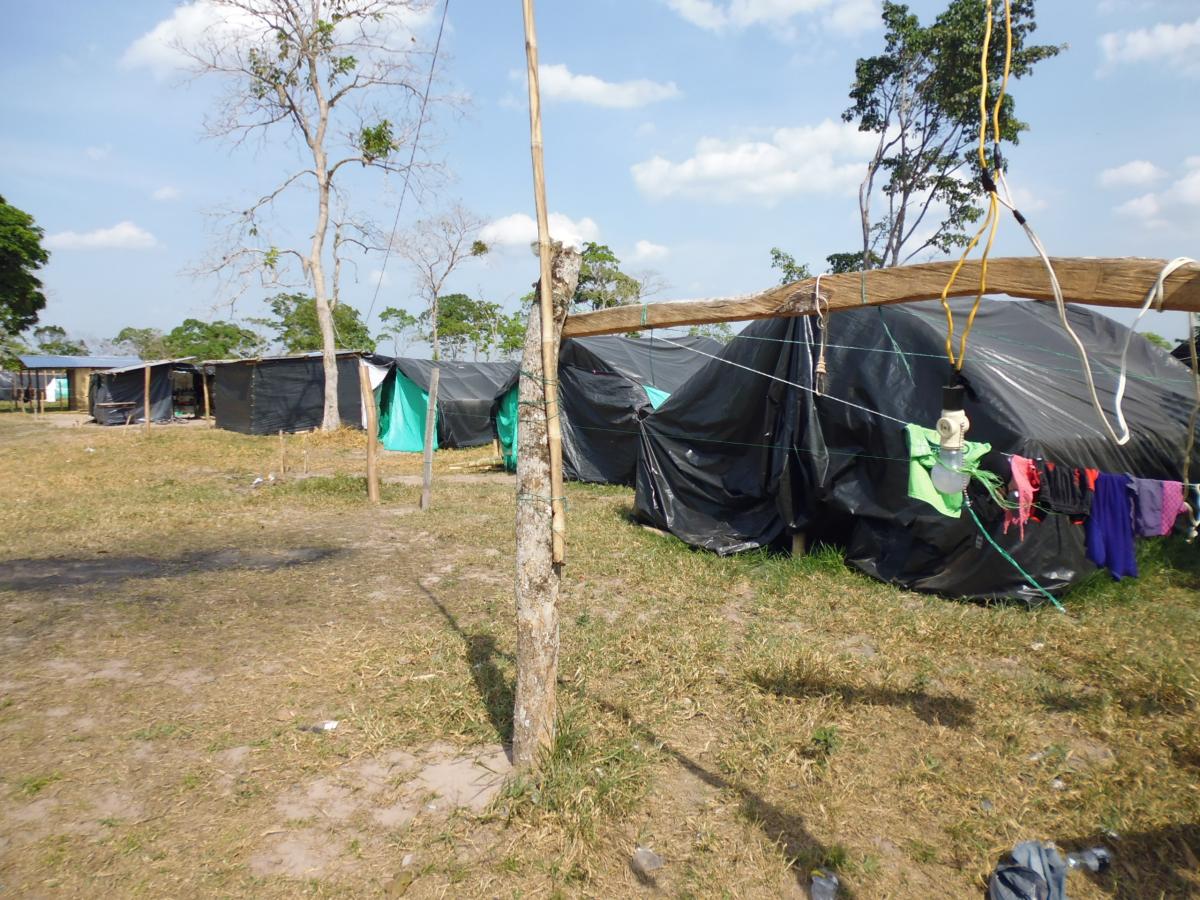
by Dawn Paley, Upside Down World
FORTUL, COLOMBIA — Holding down an occupation for five months isn't easy. Doing so in Colombia, even less so. But members of the community of Héctor Alirio Martínez in the municipality of Fortul, near the border with Venezuela, have raised the stakes even higher: they're occupying land owned by the Ministry of Defense. The 100-hectare terrain now spotted with wood and plastic homes was slated to become a large military base.
Locals say the land originally was purchased by Occidental Petroleum in order to build a large new base to coordinate protection of a new oil pipeline which passes less than a few hundred meters from the lot.
SILVIA RIVERA CUSICANQUI
Indigenous Anarchist Critique of Bolivia's 'Indigenous State'
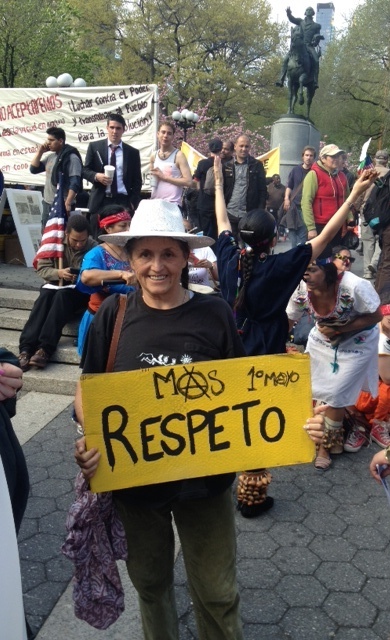
by Bill Weinberg, adopted from ICTMN
Bolivian historian and social theorist Silvia Rivera Cusicanqui is author of the classic work Oppressed But Not Defeated: Peasant Struggles Among the Aymara and Quechua in Bolivia, and has recently emerged as one of the country's foremost critics of President Evo Morales from an indigenous perspective. Indian Country Today Media Network spoke with her in New York City, where she recently served as guest chair of Latin American studies at New York University's King Juan Carlos Center. The complete text of the interview appears for the first time on World War 4 Report.
YUHANG PROTESTS SHAKE CHINESE REGIME
Thousands March Against Waste Plant in Zhejiang Province
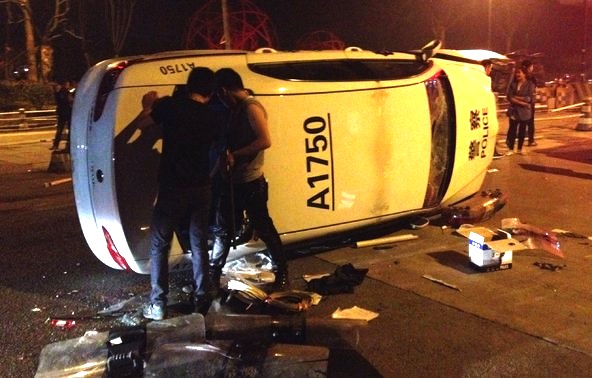
by Vincent Kolo, chinaworker.info
In March, to great fanfare, Premier Li Keqiang promised to launch a "war on pollution." But after this week's chaotic and bloody scenes in Yuhang, Zhejiang province, it seems the government has launched a "war on pollution protesters" rather than anything else. A massive crowd campaigning to stop a planned waste incinerator clashed with hundreds of riot police on May 10. The demonstrators blocking a major highway numbered 5,000, or even 30,000 according to some accounts.
Yuhang, which is 20 kilometers from the regional capital of Hangzhou, has seen largely peaceful protests on a daily basis over recent weeks. Plans to construct similar waste incinerators, which are clouded by concerns of increased rates of cancer, have met massive public opposition in other cities in recent years. According to one official source, the number of environmental "mass incidents" has risen by an average of 29 percent per year since the mid-1990s. Just one month ago the city of Maoming, in Guangdong province, saw thousands protest against a petrochemical plant, forcing the local government to "review" its plans.
DID NARENDRA MODI ABET MASS MURDER?
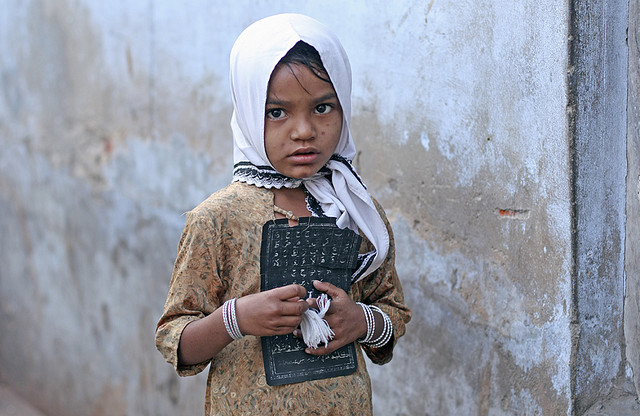
by Subuhi Jiwani, World War 4 Report
On May 16, 2014, vote counting day of India's lower-house Lok Sabha elections, I received a text with the title "Aaj ki ABCD" or the "ABCD of the day." All the letters of the alphabet were the starting points of phrases in praise of Narendra Modi. For instance, N was "Nationalist Hindu Modi"; R was "Rishwaton ka Lokayukt, Modi" or Ombudsman for Corruption, Modi; Y was "Youth ka bharosa, Modi" or Hope for the youth, Modi; and Z, unsurprisingly, was "Zindagi ka madksad, Modi" or The goal of life, Modi.
This is only a small indication of how convinced many Indians are that Modi, a Hindu nationalist, represents true Indianness and patriotism, a no-holds-barred approach to corruption (clearly a jibe at the rival Indian National Congress), and the promise of development and the availability of jobs, among other things that helped him and his Bharatiya Janata Party win a majority in these elections. This, despite the fact that Modi and 59 others have been accused of a criminal conspiracy in connection with the 2002 Gujarat pogrom—three days of anti-Muslim rioting that left more than 1,000 dead.
NIGERIA: TOWARDS A POST-PETROLEUM FUTURE
An Interview with Nnimmo Bassey
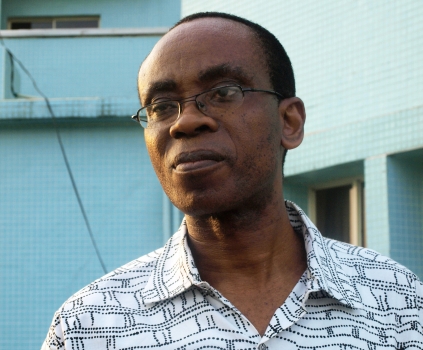
by Yemisi Akinbobola, Africa Renewal
Nnimmo Bassey, an award-winning environmentalist, is one of Africa's leading campaigners, particularly for his work in Nigeria's oil-rich Niger Delta region. Mr. Bassey was a human rights advocate in the 1980s. He was imprisoned many times by late president Sani Abacha's government in the 1990s. He is co-founder and chair of Friends of the Earth International and Environmental Rights Action. In 2009, Time magazine named him one of the Heroes of the Environment. In this interview with Yemisi Akinbobola for Africa Renewal, Mr. Bassey discusses the continuing protests by the Niger Delta people against oil pollution and makes the case for compensation.
HEARTLAND STANDS UP TO KEYSTONE
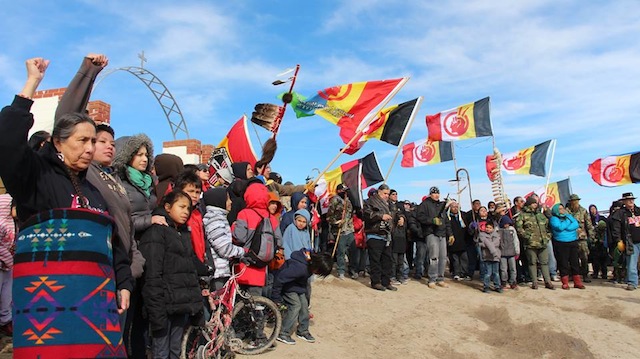
by Peter Gorman, Fort Worth Weekly
The fight against the Keystone pipeline is focused this week on a bunch of farmers in Nebraska whose lawsuit thus far has won a round in state court, delayed a decision by President Barack Obama on allowing the line to cross the US-Canada border, and apparently has TransCanada, the company that owns the pipeline, worried.
In the past four years, landowners, indigenous people, climate-change scientists, and environmentalists from Canada to South Texas have battled the tar sands expansion. Despite those protests, the southern leg of the pipeline was completed and is now in operation.
But in Nebraska, the landowners' suit against TransCanada's use of eminent domain could cause a rerouting of the northern section of the line, forcing a delay and giving opponents in both Canada and this country more time to make their case that tar sands mining and transportation could spell environmental disaster with no major economic benefit.
















Recent Updates
18 hours 45 min ago
3 days 18 hours ago
3 days 19 hours ago
3 days 23 hours ago
4 days 22 min ago
4 days 17 hours ago
4 days 17 hours ago
6 days 2 hours ago
6 days 16 hours ago
6 days 17 hours ago